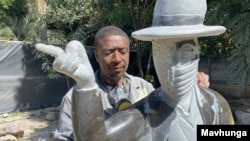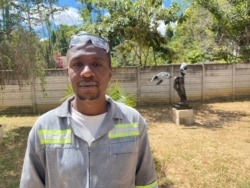Zimbabwean sculptor David Ngwerume is gaining attention for works inspired by the coronavirus pandemic. One of his collections urges people to get vaccinated. Another reminds people to take health measures, as he hammers home a message to curb the spread of the virus. Ngwerume’s latest piece is “Michael Jackson,” named after the late U.S. pop icon who was well known for wearing masks and a glove.
Forty-year-old Zimbabwean sculptor David Ngwerume is making what he calls a “COVID-19 Gallery.”
His exhibit, called “Arms,” encourages people to take the COVID jab to help the country reach its vaccination target of 60 percent by the end of the year.
Another one, called “We are torn,” encourages people to sneeze into their elbows.
And the most talked about one encourages people to mask up in an exhibit called: “MJ" - named after the late U.S. pop icon “Michael Jackson.”
“The iconic Michael Jackson was the first celebrity to move around wearing a mask and gloves. When he was asked, he stood his ground and said the air is somehow polluted," Ngwerume said. "Michael Jackson used his public figure position to highlight what he was seeing as what would come with the times; that we have the COVID pandemic. We are now wearing masks. At that time people thought he was trying to show off. He warned us. Now I am using his figure around this COVID pandemic on my art to show that Michael Jackson gave us a warning that: Mask up. His figure shows a finger pointing to us as a people to say: Mask Up.”
Ngwerume has posted his pieces online to keep most people from coming to his studio and potentially spreading the coronavirus that causes the COVID-19 disease.
Speaking via Skype, New York-based art dealer Shingirai Mafara says he wants to hold an art exhibition to display the work of his fellow Zimbabwean for a wider reach.
"I find his pieces very, very pivotal not only putting Zimbabwean art sculpture on the map, because we are already back on the map but also sending to the entire world: let’s get vaccinated, let’s wear masks, let’s social distance, hold hands and try to see this together," Mafara said. "These pieces are going to sit in the permanent collection of the United Nations World Health Organization or at a private collector’s residence. The work that David has created: a 100, 200 years from now you can look back and say in 2020/2021, we had a pandemic that killed millions and millions of people.”
Ngwerume’s work has also caught the attention of a Zimbabwe government official.
Josiah Kusena is the acting director of the National Arts Council of Zimbabwe.
“The situation has taught our artists to be resilient, to be imaginative and creative in terms of sustenance - how do you eke a livelihood in such an environment which is not easy to operate when sources of income have been closed totally," Kusena said. "So that creativity is not a surprise at all. It is also an appreciation by the artist that COVID-19 has destroyed livelihoods, but it is also an appreciation that there has been progress in research in terms of how do you contain COVID-19.”
Ngwerume says he hopes to work with art auctioneers and use part of the proceeds to get personal protective equipment or PPEs for Zimbabwe’s health workers.
Zimbabwe’s doctors and nurses have struggled due to lack of adequate resources while working in the front lines of prevention and treatment during the coronavirus pandemic. Zimbabwe has more than 38,000 confirmed coronavirus infections and 1,550 deaths, according to the Johns Hopkins University, which is tracking the global outbreak.








